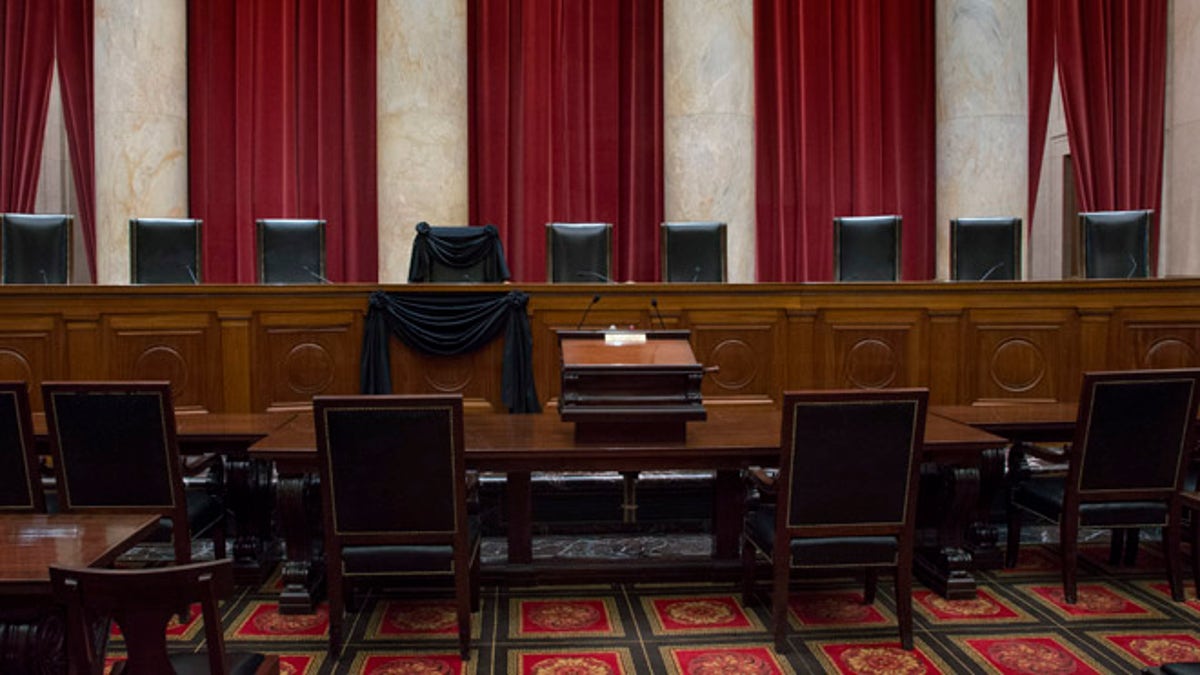
WASHINGTON, DC - FEBRUARY 15: In this handout from the the Supreme Court of the United States, U.S. Supreme Court Associate Justice Antonin Scalia's Bench Chair and the Bench in front of his seat draped in black after his death on February 15, 2016 in Washington, DC. Scalia died February 13, reportedly of natural causes, at a resort in Texas. (Photograph by Franz Jantzen/Collection of the Supreme Court of the United States via Getty Images) (2016 Franz Jantzen, Collection of the Supreme Court of the United States)
Immediately following the passing of Justice Antonin Scalia, the airwaves teemed with partisan pundits, from both sides, who highlighted the ideological implications for the balance of the court. Though the rapid posturing seemed cold, it was also apparent how much was at stake, as each session of our nation’s highest court addresses disputes of significant consequence for Americans, beyond those listed on the case docket. One such case is the ongoing smartphone war between Samsung and Apple, which is currently under consideration for review by the U.S. Supreme Court.
A decision to let the ruling stand will further incentivize patent trolls to go after small businesses, a devastating blow to small and minority businesses that are instrumental to U.S. economic growth.
On the surface, this case appears to be a fight between two giant multinational corporations. The reality is that the issues at stake—design patent infringement damages—could have wide-ranging implications for small businesses of all stripes.
Small business is not only the engine of our country’s economic growth, it is a key factor in the economic progress of underserved communities. While it is a tremendous sign of the strength and vitality of our community that Hispanics start small businesses at a rate three times higher than the general population, there are multitudes of hazards for businesses, particularly for smaller companies like many minority-owned ones. The Apple-Samsung case is indeed such a threat.
In December, Samsung filed a petition for the U.S. Supreme Court to review the ruling and remedies imposed by the United States Court of Appeals for the Federal Circuit over design patent infringement. Under the ruling, the ornamental features covered by design patents are elevated above functional elements covered by utility patents.
The designs in question are not for the entire device, but rather small elements like the rounded rectangular edges of the smartphone. But if Apple can patent a vertical rectangle for phones, can Sony patent the horizontal rectangle for televisions or cameras?
To make matters worse, the current legal interpretation allows for total product profits awards for design patent infringement, as opposed to infringement on utility patents, where remedies are dictated by the individual patent value.
Awarding damages that cover total product profit incentivizes patent trolls to use design patents because they offer much higher potential payouts and settlements. Unfortunately for small businesses, these awards can force smaller enterprises to close up shop. For businesses only bringing one product to market, total product profit is total profit, period. Simply put, trolls armed with design patents pose a threat to job creation and economic growth.
But the Supreme Court can fix this, even while the partisan dispute over Scalia’s seat continues.
The Hispanic Leadership Fund, along with the National Black Chamber of Commerce and the National Grange, filed an amicus brief last month in support of Samsung’s position. Without reasonable limits on damages for design patent claims, small businesses and consumers alike could end up bearing the biggest burdens of a design patent infringement. Companies will be less inclined to innovate and develop products because they’re at risk of paying total profits if they infringe a design patent. And if sued, their resources will be allocated to the patent dispute rather than research and development or other areas of growth. Excessive damages could force businesses to close or raise prices in the rather than face of surmounting costs.
The most prevalent form of Internet access among Hispanics is through smartphones. These devices enable connectivity for those who might not be able to afford it otherwise. Smartphones open doors to innumerable sources for education, communication, and employment. If the current ruling in the Apple-Samsung case stands, consumers may face higher prices and fewer innovative products. This case foreshadows the impact on other industries and the consumers of those products should this total profits interpretation prevail and set the legal precedent for future cases.
The Apple-Samsung case is a prime opportunity for the Court to provide clarity to the outdated interpretation of design patent infringement damages.
A decision to let the ruling stand will further incentivize patent trolls to go after small businesses, a devastating blow to small and minority businesses that are instrumental to U.S. economic growth. Letting the ruling stand will solidify legal precedent that will hinder entrepreneurship and create significant barriers for Hispanic and other minority owned businesses.
A recent report from the Stanford Latino Entrepreneurship Initiative found a $1.4 trillion disparity in average annual sales between Hispanic and non-Hispanic owned businesses.
One way to look at that is to say that there is a potential for the American economy to benefit massively with growth from Hispanic-owned businesses alone. As an organization that is invested in the future of minority businesses, especially by supporting constructive public policies and contesting threats, the last thing we want to see is a business climate that inhibits the ability of these businesses to succeed, grow, and thrive.
